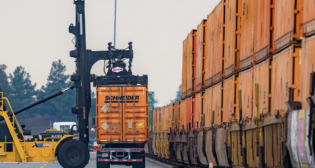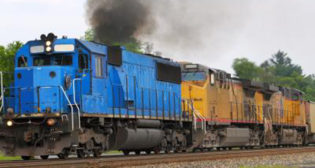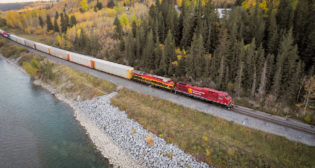
Draft Bill a ‘Rat Hole Worth Watching’ (Updated 2:45 p.m. July 15)
Written by Frank N. Wilner, Capitol Hill Contributing EditorEditor’s Note: Fewer than six hours following Railway Age’s exclusive reporting on a controversial draft bill headed to a July 20 mark-up before the House Transportation & Infrastructure Committee, Chairperson Peter DeFazio (D-Ore.) removed the bill from consideration. (Mark-up is a parliamentary term meaning to vote within committee on a final version and whether to send that final version to the House floor.) Although the T&I Committee will mark-up other bills on July 20, the Freight Rail Shipping Fair Market Act will not be among them, the committee’s Democratic staff advised. Railway Age was told DeFazio is “not giving up,” but the absence of identifiable Republican support for a bill with rail labor’s fingerprints blocked any effective path forward. There may be, said the source, a renewed effort after Labor Day—when Congress returns from its August recess—to resurrect the bill. A Republican source told Railway Age, “We do plenty of bipartisan work within the T&I Committee. Although we were open to listening to committee Democrats, they were unwilling [to include us in discussions].”
The soon-to-retire DeFazio, a pariah among Senate Republicans—and many Democrats—for his 2021 alleged partisan demands during bipartisan efforts to craft the $1 trillion Infrastructure Investment and Jobs Act (IIJA), had been pushing special interest legislation at the behest of rail labor that has attracted, as unwitting fellow travelers, many rail captive shippers.
DeFazio is embracing what could be bait-and-switch tactics by dangling a few shipper-friendly legislative provisions so as to encourage shippers to exert pressure on House and Senate Republicans to join Democrats in passing the DeFazio-sponsored Freight Rail Shipping Fair Market Act. The bill’s core objective, however, appears to be creation of more railroad jobs that is hardly shipper or railroad friendly, or conducive to fighting price inflation.
The bill’s final language was—before DeFazio pulled it—to be voted on in the T&I Committee July 20. A draft was undergoing edits earlier this week, with T&I Democratic staff continuing to confer with shipper and rail labor lobbyists as to its content.
The shipper-friendly provisions in earlier drafts are said by sources to have been watered down from earlier versions so as to satisfy rail labor, but not so much as to dilute shipper support. Finding compromise in a final version would be difficult, as shipper interests only marginally coincide with those of rail labor. It is shippers, however, who are needed by DeFazio to lobby Republicans.
So far, Republicans are having none of it, telling shipper lobbyists that the core labor elements of the DeFazio bill are actually antithetical to shipper interests as they will drive up rail costs and, hence, rail rates. In fact, a more qualified STB already is acting in response to shipper concerns without entertaining labor-desired rail cost increases. Republicans are thus urging shippers to await “next year” when Republicans are likely to regain House and Senate majorities and be better able to take actions the STB might have failed to resolve.
Of course, Class I railroads, led by the Association of American Railroads, oppose the DeFazio legislation. Railroads also oppose STB efforts to cure recent railroad service failures; simplify the process for challenging rail rates assessed captive shippers; and restore, through a reciprocal switching mandate, two-railroad competition eliminated by decades of railroad mergers. While railroads may succeed in derailing the DeFazio bill, it is unlikely they will prevail in blocking STB actions expected later this year. That effort will be commenced in appellate courts.
DeFazio’s strategy is mindful of stomach-churning sausage making. While confident of sufficient Democratic votes to move his bill successfully through the T&I Committee and the House, DeFazio’s challenge is in the Senate chamber, which he has a history of mocking. His strategy, say sources, is to use rail shippers as a wedge to break Republican ranks so as to snake the bill through the evenly divided Senate.
First, DeFazio wants rail shippers to pressure GOP House members to embrace his labor-friendly bill. With Republican ranks split, pressure then will be applied to Senate Commerce Committee Chairperson Maria Cantwell (D-Wash.) to entertain the bill in her evenly divided committee, reasoning that with just one Republican vote it can be voted out of committee and onto the Senate floor. Absent a split in Republican ranks, the bill cannot survive a Commerce Committee vote.
Ultimately, goes the DeFazio scheme—assuming a break in Republican ranks—at least 10 Senate Republicans must be convinced, with pressure from shippers, to support the bill on the Senate floor, providing the 60 votes necessary to avoid a filibuster and pass the House version.
Notably, 12 Republican senators—Mike Braun (Indiana); Shelley Moore Capito (West Virginia); Kevin Cramer and John Hoeven (North Dakota); Mike Crapo and James Risch (Idaho); Joni Ernst and Chuck Grassley (Iowa); John Kennedy (Louisiana); Roger Marshall (Kansas); Mike Rounds (South Dakota); and Marco Rubio (Florida)—signed a May 23, 2022, letter to the STB urging it use its “oversight role” to “examine all constructive options towards ensuring reliable, consistent rail service is available to shippers across the U.S. rail network.”
More significant, however, the letter recognizes the statutory role of the STB as the lead agency to address shipper issues. There is no mention in the letter of usurping STB authority such as does the DeFazio bill. The 12 Republican senators appear fully to recognize the congressional role as one of expert-agency oversight rather than of meddling in specialized and complex rail economic regulatory actions—unless, of course, there be a failure of the STB to act.
Equally noteworthy, the STB has not sought DeFazio’s involvement in its day-to-day statutorily defined functions.
DeFazio appears more on a mission to repay rail labor for years of financial support toward his political candidacies, choosing a Hail Mary mission reminiscent of that 50-yard touchdown pass from Dallas Cowboys quarterback Roger Staubach that defeated the Minnesota Vikings in a playoff game with just 24 seconds remaining on the clock in 1975.
DeFazio has more time, but his arm strength is questionable, as evidenced during bipartisan crafting of the IIJA.
As reported at the time, DeFazio’s attempt to write the IIJA was “neutered” by the Senate, resulting in DeFazio terming the Senate version that ultimately passed (under a House bill number) as “crap.” That Senate snub is remarkable given that the T&I Committee has oversight of every mode of transportation—oversight split among three Senate committees—suggesting DeFazio should have taken the lead. But he so angered Senate members with alleged partisan “cantankerousness” that the Senate shunted DeFazio aside. Comes now DeFazio’s Hail Mary challenge of finding support among GOP members he recently dissed.
A further hurdle is that Republicans in the House and Senate who break ranks and sign-on to the DeFazio bill risk the wrath of the Republican leadership who will be assigning committee slots in the 118th Congress that debuts next year.
Among provisions in the draft bill, as identified by sources:
- Require rail operational changes so as to improve alleged working conditions, including availability policies, faced by train and engine service workers. The intent is to require additional hiring.
- Amend the STB’s statute to create “reverse demurrage,” allowing shippers to assess railroads a daily rental fee on privately owned freight cars delayed at loading, unloading or in-transit. Here, again, additional workers must be hired to avoid the delays.
- Create a more comprehensive definition of the common carrier obligation, which includes establishing nationwide service standards—a one-size-fits-all approach likely to be problematic, but which will require additional hiring by railroads. Differences in geography, length of haul, traffic mix and shipper price-service elasticities auger against such a mandate. The provision ignores, for example, that service standards for coal trains cannot mirror those for highly competitive intermodal trains. The STB already said it intends to review the common carrier obligation.
- Revoke, as now allowed by statute, STB authorized regulatory exemptions that have permitted railroads and shippers to enter into arms-length confidential contracts, themselves establishing contractual service standards and rates. The statute already assures that traffic moving under contract cannot impair service provided other rail shippers. The STB already has a rulemaking under way in this area.
- Amend the STB’s statute to mandate Amtrak passenger train access to freight rail track regardless of its impact on freight operations. This would prevent the STB from investigating, in each instance, the benefits and costs associated with Amtrak route expansions. As Amtrak service expands, so will the Amtrak work force.
- Said to have been stripped from a draft bill is a statutory mandate for reciprocal switching—a primary objective of captive shippers—as labor views such a mandate as adversely affecting existing jobs. Reciprocal switching already is the subject of an STB rulemaking expected to be completed by year’s end.
Oh, by the way, there is another chapter to the DeFazio strategy—a truly diabolical one sausage makers would celebrate in perpetuity. The DeFazio bill would be readied for House floor action on the date in mid-September that rail labor would strike after rejecting non-binding contract-settlement recommendations from a Presidential Emergency Board. The House Rules Committee would find the DeFazio bill germane as a rider to a House-crafted back-to-work order—must-pass legislation that, if blocked in the House or the Senate, would troublingly extend an economy-jolting rail work stoppage. Brilliant, eh?
As former AAR President William H. Dempsey often said of troubling legislation and events, “This is a rat hole worth watching.” Indeed!

Railway Age Capitol Hill Contributing Editor Frank N. Wilner formerly was assistant vice president for policy at the AAR, an STB chief of staff, president of the STB’s bar association, and public relations director for a rail labor union. Delayed owing to the COVID pandemic is his seventh book, “Railroads & Economic Regulation,” now scheduled for publication later this year.



